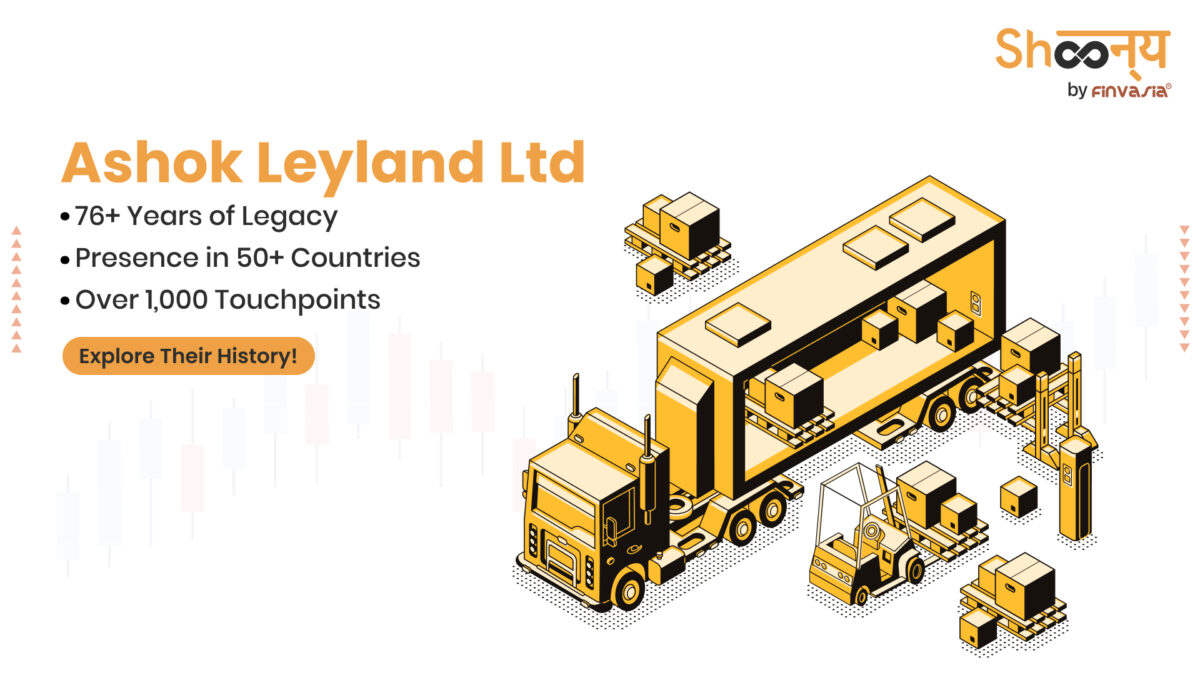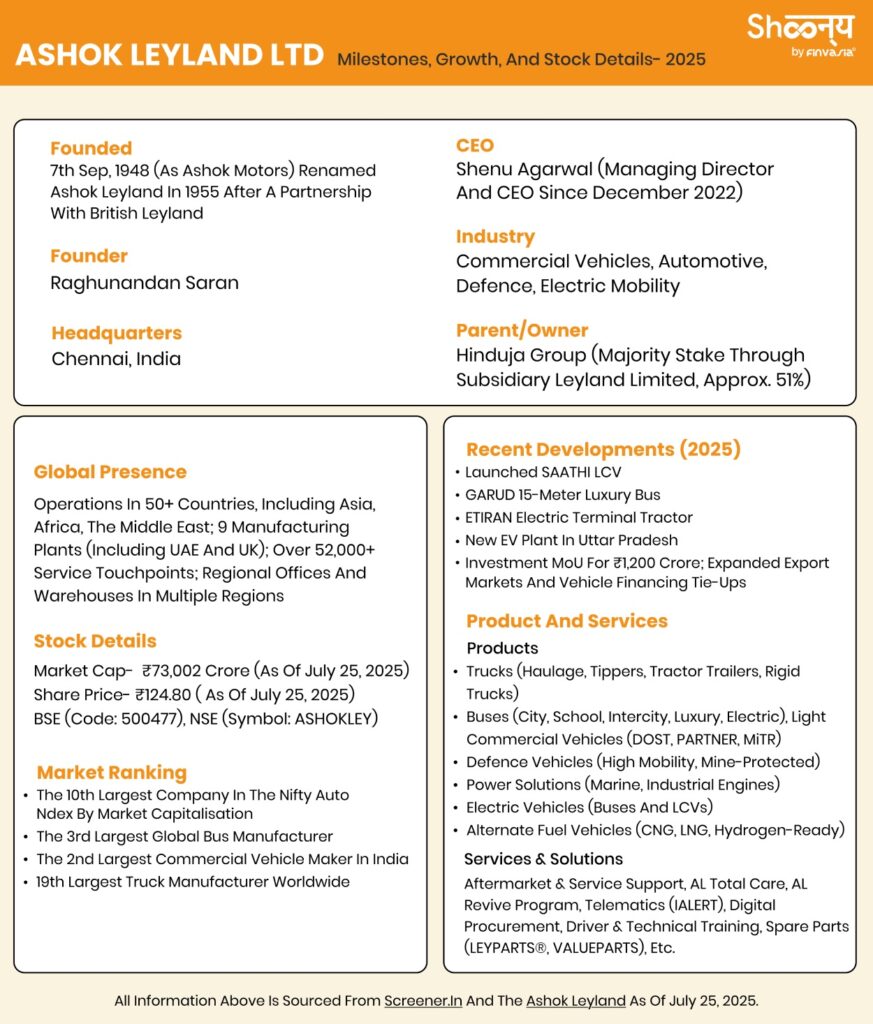Ashok Leyland History, Share Price, Revenue & Company Insights 2025

Every time you see a loaded truck on the highway or a mini pickup delivering groceries in your street, on most of them, you would read- Ashok Leyland. This auto brand has been carrying the weight of India’s economy for over 75 years. From the vegetable vendor’s delivery van to the army’s frontline transport vehicles, Ashok Leyland powers the vehicles that power India. It’s the name behind the engines that connect villages, cities, and businesses every day. Most of the people still think of Tata and Mahindra when they hear the word ‘trucks’. But Ashok Leyland is among the top 10 commercial vehicle makers in the world. As of July 25th, 2025, Ashok Leyland Ltd is the 10th largest company in the Nifty Auto Index by market cap.
Let us explore the history of the company that has been powering transport across the globe since 7 September 1948!

Ashok Leyland History: Driving India’s Journey Since 1948
It all began in 1948.
India had just gained independence, and an intellectual man named Raghunandan Saran set out to build a modern industrial future.
Ashok Motors was born in Madras!
By 1955, with a partnership from British Leyland, the company was named Ashok Leyland.
In the late sixties, Ashok Leyland gave India its first double-decker bus. It was a solution to crowded urban transport. By designing a bus that could carry more people without taking up more space on the road, Ashok Leyland proved it understood what the country needed. Not long after, it introduced front-door engine buses and then rear-engine buses, making it easier for passengers to board and for buses to run more efficiently.
The 1980s brought a new benchmark when the company rolled out the country’s first 13-tonne truck. That single launch changed how freight was carried across India. With more power and bigger load capacity, this truck helped move goods faster and in larger quantities. Around the same time, vestibule buses also made their entry, stretching capacity even further for densely populated routes.
When the conversation around cleaner fuels began, Ashok Leyland stepped up once again.
In 1997, it launched India’s first CNG-powered bus in Delhi.
This was a statement that the company would be part of the solution to India’s pollution problem. Years later, in 2004, came another major improvement in passenger mobility.
Ashok Leyland Ltd introduced a bus with a step-less entry and a flat floor. For senior citizens, school children, and passengers with disabilities, this was a great innovation.
By 2008, Ashok Leyland began focusing on smaller commercial vehicles too. It introduced a factory-fitted air conditioning system in its SCVs in 2011. For drivers who spent long hours in hot conditions, this was a welcome shift toward driver-first design.
In 2012, the single-step entry bus made public transport more inclusive. Just two years later, Ashok Leyland launched India’s first international-style truck cabin.
It wasn’t just about looks. It meant better ergonomics, higher safety standards, and driver comfort that matched global benchmarks. The same year, it introduced a school bus designed to meet rollover compliance standards, showing how seriously it took safety, especially for children.
Ashok Leyland also led the charge into electric mobility. As early as 2015, the company put India’s first zero-emission electric bus on the road. This wasn’t a trend-driven decision. It was part of a long-term vision to cut down on urban pollution and create cleaner cities.
In the years that followed, they also introduced India’s safest school bus and the first electric bus made completely in-house.
The company rolled out battery-swapping technology. It was a significant move to address charging time and range issues that most electric vehicles struggled with.
This innovation gave fleet operators more confidence to switch to electric.
Performance and emissions were tackled with the same passion. The iEGR technology launch brought compliance with BS-IV emission standards without requiring AdBlue or complex external systems. This was followed by the iGen6 engine platform in 2019, which improved fuel efficiency and lowered ownership costs for fleet owners.
In 2020, India saw its first truly modular commercial vehicle platform—AVTR—giving fleet operators the power to customise trucks based on exact business needs.
While the company made all these moves in the heavy vehicle segment, it didn’t forget the small players. In 2020, Ashok Leyland launched the first small commercial vehicle with an ARAI-certified three-seater cabin.
The pace of innovation only picked up in the following years. From the 4×2 DTLA tipper in 2021 to the launch of an automated manual transmission tipper in 2022, the focus remained clear: reduce driver fatigue, increase vehicle efficiency, and deliver unmatched performance.
The 2620 8×2 eight-tyre truck launched in 2023 pushed boundaries in load optimisation and mileage. In the same year, the company took a bold step into alternative fuel with a range that included LNG, CNG, and hybrid options, geared for a future of sustainable transport.
In 2024, Ashok Leyland signed an MoU with the Tamil Nadu government for a ₹1,200 crore investment, reflecting its commitment to local manufacturing and innovation.
That same year, the company introduced Garud, a 15-meter multi-axle premium bus chassis at the M&HCV Expo in Bengaluru, built for luxurious long-haul journeys.
In 2025, the company is set to launch a new EV manufacturing plant in Uttar Pradesh. Initially set to produce 2,500 electric buses a year, this plant will scale up production and strengthen India’s EV infrastructure for commercial transport.
In the last quarter of the financial year (ending March 2025), the Ashok Leyland revenue profits went up a lot, 38% more than the previous year. For the whole year, they made a profit of ₹3,303 crore.
They also gave out two big interim dividends. Plus, they announced a 1:1 bonus share issue, so existing shareholders will get extra shares.
In June 2025, they sold over 15,000 vehicles, with bus exports growing rapidly.
Here’s a look at the newly launched Ashok Leyland’s products this year-
- SAATHI LCV: A small but strong light commercial vehicle. It carries good loads and gives drivers plenty of space.
- GARUD 15 Bus: A luxury 42-sleeper bus, perfect for long-distance travel with comfort and safety.
- eTIRAN Electric Tractor: India’s first electric vehicle made specifically for ports and terminals, helping reduce pollution.
If you follow the industry and top components of the Nifty Auto Index, this company is definitely one to watch!
Open a free demat account and make your first investment today!
About Ashok Leyland
Ashok Leyland is one of India’s leading commercial vehicle companies. It started over 75 years ago and has grown into a global brand. The company makes a wide range of vehicles like trucks, buses, light commercial vehicles, defence vehicles and power engines. Headquartered in Chennai, Ashok Leyland is the flagship company of the Hinduja Group.
Its vehicles are not only seen on Indian roads, but also operate in over 50 countries. From manufacturing to servicing, Ashok Leyland has built one of the largest networks in the industry.
The company is also known for its work with the Indian Army and its award-winning manufacturing plants. It has introduced many innovations in commercial vehicles, including clean fuel technologies and intelligent engine systems.
Ashok Leyland Limited Ranking 2025
- A USD 4.5 billion company with over 75 years of history
- Second-largest commercial vehicle maker in India
- Fourth-largest bus manufacturer in the world
- Nineteenth-largest truck manufacturer globally
- First Indian CV maker to get OBD-II certification for BS-IV engines
- Recently ranked as the 34th best brand in India
Ashok Leyland Products and Services
| Product Category | Description / Sub-Types |
| Trucks | Haulage Trucks, Tippers, Tractor Trailers, Rigid Trucks, Intermediate Commercial Vehicles |
| Buses | City Buses, School & Staff Buses, Intercity Coaches, Luxury Coaches, Electric Buses |
| Light Commercial Vehicles (LCVs) | DOST Series, PARTNER Series, MiTR Minibus |
| Power Solutions | Diesel & Gas Genset Engines, Marine Engines, Industrial Engines, Agricultural Engines |
| Defence Vehicles | High Mobility Vehicles, Mine-Protected Vehicles, Field Artillery Tractors, Tactical Trucks |
| Electric Vehicles (EVs) | Electric Buses, Battery-operated LCVs |
| Alternate Fuel Vehicles | CNG Trucks & Buses, Hydrogen Fuel-ready Vehicles (in development) |
| Spare Parts | LEYPARTS®, VALUEPARTS, Custom Repair Kits |
| Digital Solutions | iALERT Telematics, AL Care App, AL Live Tracking, Uptime Solution Centre |
| Service Products | AL Total Care, AL Revive, Annual Maintenance Contracts, Ecom Support, At-site Support |
Services and Offerings-
Trucks, Buses, Light Commercial Vehicles (LCVs), Power Solutions, Defence Vehicles, Service Support, AL Total Care, AL Revive Program, Technical Training, Driving Training, Spare Parts Support, LEYPARTS®, VALUEPARTS, Genuine Parts, Annual Maintenance Contracts, AL Recon, At-site Service Support, Ecom Support, AL Care, iALERT 3.0 Telematics, Uptime Solution Centre, AL Live Tracking, LeyKart Digital Procurement Platform, Loyalty Programs, Re-AL, Foundry Services, Global Presence, Alternate Fuel Solutions, Dealer Locator, Digital Helpline Support.
Leading the Way to a Greener, Fairer Future- Ashok Leyland’s ESG Efforts
Ashok Leyland is strongly committed to ESG (Environmental, Social, and Governance) initiatives, focusing on building a greener tomorrow. They actively promote sustainable mobility with over 750 electric buses on the roads and recent launches of electric light commercial vehicles and India’s first hydrogen fuel cell bus.
Their renewable energy usage reached 57% in FY23, with 37% from solar and 20% from wind power. The company also promotes diversity, including women-centric production lines and campaigns to encourage women in heavy vehicle driving.
Ashok Leyland Ltd- FAQs
Ashok Leyland is a flagship company of the Hinduja Group, which holds a majority stake through its subsidiary Leyland Limited (around 51% ownership).
The CEO (Managing Director and CEO) is Shenu Agarwal, who took charge in December 2022 and continues in this role as of 2025.
As of July 24, 2025, Ashok Leyland’s share price was ₹124.80.
Globally, Ashok Leyland ranks 3rd among bus manufacturers and is 2nd in domestic commercial vehicle sales in India. As of July 25th, 2025, it ranks 10th among Nifty Auto companies, based on market cap.
The company manufactures trucks, buses, light commercial vehicles, defense vehicles, engines, and spare parts, serving more than 50 countries worldwide. It is known for innovation in sustainable and electric mobility solutions.
Tata Motors leads in northern and western India and dominates the LCV segment, while Ashok Leyland is a strong contender in southern India and in medium and heavy commercial vehicles. The choice depends on specific vehicle needs and segments.
The Hinduja Group is the primary owner, represented through its subsidiary Leyland Limited, with a controlling stake and major influence on company strategy.
Source: Screener
______________________________________________________________________________________
Disclaimer: Investments in the securities market are subject to market risks; read all the related documents carefully before investing.








